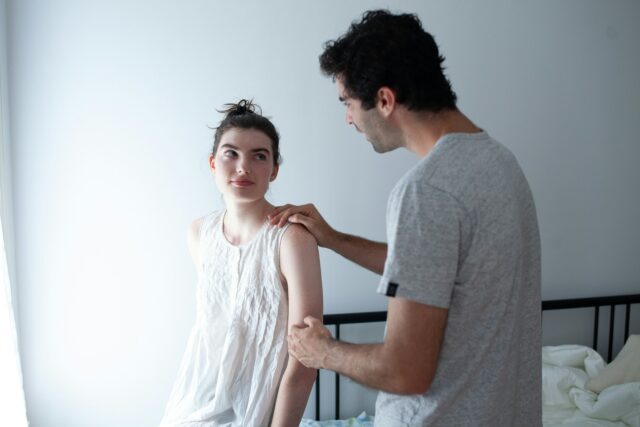When a woman starts to emotionally check out of a relationship, it’s not always obvious—at least not at first.

There’s rarely any shouting, and no ultimatums, or storming out the door. More often, it’s calm, subtle, and wrapped in politeness or routine. Many women will keep showing up physically long after they’ve started leaving mentally, especially if they once cared deeply. If you’re noticing a change, or wondering if she’s already drifting, here are some small signs that might mean that she’s emotionally done, even if she hasn’t said it yet. If you want to save the relationship—if that’s even possible—you’ll need to act fast.
1. She stops arguing.

When something bothers her, she no longer brings it up. Not because it doesn’t affect her, but because she’s given up on it changing. The fire to fix things has burned out, and silence feels easier than repeating herself. It might seem like peace, but it’s often a sign of resignation. A woman who no longer fights for the relationship may have already accepted that it’s no longer worth the energy.
2. She makes decisions without checking in.

Whether it’s booking a weekend trip, making a big purchase, or planning her schedule, she stops asking what you think. She’s not being rebellious. It’s just that your input no longer feels necessary to her world. This change usually happens when she starts seeing herself as a separate unit again. She may not be gone physically, but mentally, she’s already moving independently.
3. Her tone becomes neutral, even during conflict

Emotion fades from her voice. Instead of frustration or hurt, there’s detachment. She might still respond, but it’s mechanical, not emotional. It’s the difference between someone who’s invested and someone who’s simply enduring. You may notice that her reactions feel flat, even in moments that once would’ve sparked strong feelings.
4. She stops sharing personal updates.

Where she used to tell you everything—how her day went, who annoyed her at work, what’s on her mind—she now keeps it short or skips it entirely. You’re no longer the first person she wants to tell things to. It’s got nothing to do with secrecy. Instead, it’s about emotional disconnection. When the emotional bond frays, the urge to include you in her inner world fades too.
5. She puts more effort into things outside the relationship.

You might notice she’s suddenly pouring herself into work, friends, the gym, or new projects. Her focus starts moving away from the relationship and into anything that gives her a stronger sense of self. This isn’t always a red flag, but if it’s paired with emotional distance, it can mean she’s trying to refill a cup that the relationship no longer helps to fill.
6. She doesn’t react when you pull away.

If you go quiet, forget to text back, or act distant, she doesn’t mention it. She might still notice, but she no longer feels compelled to chase your attention or question your mood. This isn’t emotional strength—it’s detachment. She’s no longer affected in the same way, which often means her emotional investment has already started to fade.
7. She’s not interested in talking about the future anymore.

Things like holidays, big life plans, or even casual “someday” conversations quietly stop. She might brush them off, change the subject, or give noncommittal answers that keep things vague. When a woman starts detaching, she often stops mentally including you in her vision of the future. It’s not always obvious, but it’s almost always deliberate.
8. Her affection becomes inconsistent or mechanical.
 Source: Unsplash
Source: Unsplash She might still hug you or say the right things, but there’s a distance to it. It feels more like routine than genuine connection, like she’s going through the motions because it’s easier than explaining why she doesn’t feel it anymore. You may not even notice at first, but something will feel different. There’s a lack of warmth that wasn’t always there, and once it starts, it usually grows.
9. She doesn’t get jealous or protective.

Even if you’re being flirted with or getting attention elsewhere, she doesn’t bat an eye. Where there might once have been playful jealousy or protective energy, now there’s indifference. It’s not that she suddenly trusts you more—it’s that she doesn’t feel emotionally attached enough to be affected. That emotional withdrawal speaks louder than any confrontation would.
10. She doesn’t ask for your opinion anymore.
 Source: Unsplash
Source: Unsplash When she’s wrestling with a decision or struggling with something, she doesn’t come to you. She might talk to friends, process it alone, or handle it quietly—but your perspective stops feeling essential to her. That change means that you’re no longer her emotional anchor. Even if everything looks fine on the outside, it’s a sign that closeness is fading underneath the surface.
11. She stops celebrating your wins.
 Source: Unsplash
Source: Unsplash When something goes well for you, her enthusiasm is muted. She might still say congratulations, but the energy behind it is flat. The emotional investment in your highs and lows has changed. She may still want good things for you, but she’s not emotionally involved in your journey anymore. That level of disconnection can feel subtle at first but runs deep over time.
12. She starts spending more time alone, and prefers it.

Alone time used to be something she needed to recharge. Now, it feels like something she chooses more often than she chooses you. She might say she’s just tired, but really, she’s finding peace in the quiet that the relationship no longer brings. That’s not avoidance; it’s emotional clarity. When time alone feels more comforting than time together, it’s usually because the connection no longer feels nourishing.
13. She stops bringing things up more than once.

Before, she might’ve reminded you of things, repeated herself, or tried again when something didn’t land. Now, she says it once and leaves it there. No chasing. No follow-up. It’s a subtle way of saying, I’m not going to keep trying to make you hear me. When someone has mentally checked out, they start letting things slide—not because they’ve forgiven them, but because they’ve stopped expecting change.
14. She avoids eye contact in emotional moments.

You may notice she looks away when things get tense or vulnerable. There’s less lingering, less warmth, less emotional intensity in her gaze when something matters. It’s one of those things that’s hard to name but easy to feel. When the emotional connection fades, the eyes are often the first place it shows up.
15. Her responses get shorter and colder as time goes on.

Texts that used to be paragraphs are now one-liners. Conversations that once flowed feel more clipped. There’s a sense that she’s only responding out of politeness, not desire to connect. This change isn’t because she’s suddenly busy—it’s detachment. When someone emotionally leaves, the way they communicate slowly becomes more formal and less emotionally charged.
16. She starts giving more love to other people.

Friends, coworkers, family, even strangers—she’s pouring care and attention everywhere else but the relationship. Not in a dramatic or spiteful way, but in a way that clearly shows where her energy is flowing now. It’s a subtle re-direction of love. She still has it to give; she’s just not giving it to you in the same way anymore.
17. She no longer corrects things that bother her.

Behaviours that used to spark discussions or boundary-setting now go unchecked. She no longer brings up what’s bothering her—not because it stopped, but because she’s emotionally checked out enough not to care anymore. Indifference is often mistaken for peace, but in relationships, it usually signals that someone has stopped hoping for change.
18. She stops initiating affection or conversation.

There’s a noticeable drop in how often she reaches for your hand, sends a thoughtful message, or starts a meaningful conversation. You’re no longer feeling her presence in the way you used to. When emotional energy fades, physical and verbal expression usually follow. Not abruptly, but gradually enough that one day you notice you’re always the one trying to close the gap.
19. She smiles less around you.

The little moments that used to bring joy—your inside jokes, quiet rituals, shared glances—start fading. Her smile around you feels more distant, less frequent, or forced. You may still get a version of her, but not the version that once lit up when you entered the room. And while she might still care on some level, the joy has been replaced with habit.
20. She doesn’t seem hurt anymore, just done.

Perhaps the clearest sign is that she no longer reacts the way she used to. No anger, no tears, no frustration. Just quiet, composed detachment. She’s stopped hoping for something to change. When a good woman checks out emotionally, she often does it slowly and silently. Not because she wants to hurt you—but because she’s already been hurting for a long time without being heard.




